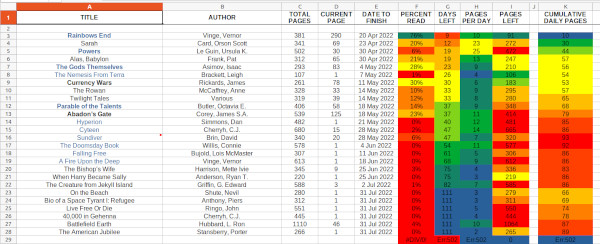I’ve got a mild case of ADHD. As a kid, I took ritalin from grade 3 through about grade 8, and as an adult, I occasionally self-medicate with caffeine (usually in the form of soft drinks, since I don’t drink coffee or tea). I can function all right without treating it, but I am more prone to getting distracted when I don’t. But leaving it untreated also makes it easier for me to make interesting connections between seemingly unrelated subjects, which improves my creativity, so it’s more of a trade-off between being more productive vs. being able to make leaps of logic and switch between subjects more easily.
In terms of reading, ADHD makes it very difficult for me to finish long books, unless I’m hooked all of the way through, which is rare. I’ll often start books but drift away from them without either finishing them or making the conscious decision not to finish them. Over time, this makes me less enthusiastic about reading, since I’ve got a huge pile of unfinished books behind me that I can’t easily get back into, because I’ve forgotten what was happening in them.

Well, I recently found a new reading technique (or rather, a new reading accountability technique) that helps me to hack my ADHD to read more, not less. It starts with keeping a reading log on a separate spreadsheet, with columns to track total pages, pages already read, and the date to finish reading, among other things.
Most importantly, it has a column for “cumulative daily pages,” which is just the sum of all the pages you have left to read up to a certain date, divided by the number of days left. In the spreadsheet above, the formula is “=(SUM(C$3:C[current row]-SUM(D$3:D[current row]))/G[current row]”.
What the cumulative daily pages tells you is how many pages you have to read each day, not just of the given book, but of all the books before it, in order to finish that book by the given date. So in the screenshot above, if I want to finish Sundiver by May 28th, I need to read 93 pages per day across any of the books listed above it. I can read all 93 of those pages in Sundiver and still stay on goal, or I can read 93 pages of Cyteen instead, or I can spread them out by reading 7-8 pages of each of the 14 books with a “due” date before May 28th. Or any other combination.
Changing the “due” date also changes the cumulative daily pages, so I can also bring that number down by extending the deadline and reordering the books in descending order by “due” date. I’ve also color coded the pertinent columns using conditional formatting, but that’s just for personal convenience. The redder a number is, the more I need to bring it down (or up, in the case of percent read). For daily cumulative pages, I like to keep the half-dozen books with the soonest “due” date pretty low, so that I don’t have to focus on them exclusively.
And that’s where the ADHD hack comes in. Because instead of trying to read just one book from start to finish, the reading log allows me to skip from book to book without losing track of which ones I still have to read. That way, when one book begins to feel like a slog, I read to the end of the chapter and skip to the next book. My ADHD-addled brain says “Oh look! Something new!” and I get excited about reading again. And I don’t fall into the trap of feeling like I’m not making any progress, because I can see it all there on the spreadsheet.
Of course, the big danger is that when I think back on what I’ve read, I’ll remember an epic tale about how rabbits colonized Mars and uplifted dolphins while the dark lord raised the cauldronborn and killed vampires for the government. In space. But hey, at least I’m reading lots of books now!
4 comments